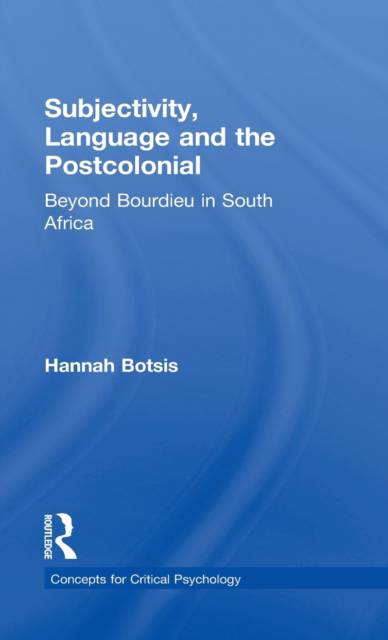
- Afhalen na 1 uur in een winkel met voorraad
- Gratis thuislevering in België
- Ruim aanbod met 7 miljoen producten
- Afhalen na 1 uur in een winkel met voorraad
- Gratis thuislevering in België
- Ruim aanbod met 7 miljoen producten
Omschrijving
In Subjectivity, Language and the Postcolonial, Hannah Botsis draws on theoretical work that exists at the intersection of critical social psychology, sociolinguistics and the political economy of language, to examine the relationships between language, subjectivity, materiality and political context.
The book foregrounds the ways in which the work of Bourdieu could be read in conjunction with 'poststructural' theorists such as Butler and Derrida to offer a critical understanding of subjectivity, language and power in postcolonial contexts. This critical engagement with theorists traditionally from outside of psychology allows for a situated approach to understanding the embodied and symbolic possibilities and constraints for the postcolonial subject. This exploration opens up how micro-politics of power are refracted through ideological categories such as language, race and class in post-apartheid South Africa.
Also drawing on the empirical findings of original research undertaken in the South African context on students' linguistic biographies, the book offers a unique perspective - critical social theory is brought to bear on the empirical linguistic biographies of postcolonial subjects, offering insight into how power is negotiated in the postcolonial symbolic economy.
Ideal for advanced undergraduate and postgraduate students on courses including social psychology, sociolinguistics, sociology, politics, and education, this is an invaluable resource for students and researchers alike.
Specificaties
Betrokkenen
- Auteur(s):
- Uitgeverij:
Inhoud
- Aantal bladzijden:
- 134
- Taal:
- Engels
- Reeks:
Eigenschappen
- Productcode (EAN):
- 9781138289338
- Verschijningsdatum:
- 10/11/2017
- Uitvoering:
- Hardcover
- Formaat:
- Genaaid
- Afmetingen:
- 140 mm x 216 mm
- Gewicht:
- 303 g

Alleen bij Standaard Boekhandel
Beoordelingen
We publiceren alleen reviews die voldoen aan de voorwaarden voor reviews. Bekijk onze voorwaarden voor reviews.












